Farming has never been an easy job — with unpredictable weather conditions, extensive labor requirements, and an ever-changing consumer market, farmers have a plethora of challenges to overcome to ensure their livelihood.
Another emerging challenge is navigating societal concerns about climate change — as the world wrangles with carbon emissions, many are looking toward farmers and agriculture as a potential avenue to reduce their carbon footprint.
Agriculture in the U.S. accounts for approximately 10 percent of total greenhouse gas emissions, and efforts to reduce this number have been widespread by promoting various ways of reducing methane emissions and sequestering more carbon in plants.
For the most part, however, farmers can feel like they are at a crossroads over what agronomic practices they should continue to use as they grapple with minimizing carbon emissions while still turning a profit.
“Regenerative agriculture” has been touted as a suite of farming practices that can dramatically increase carbon sequestration while still being profitable, but with no formal definitions of this term and so many conflicting avenues toward being “regenerative,” many farmers have left policies and debate over this approach to activists and politicians, choosing to focus on their individual metrics for success and operational sustainability.
This comes as no surprise, because farmers have to think about their livelihood and bottom line first and foremost.
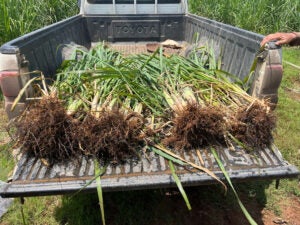
Instead of touting the broad umbrella term “regenerative agriculture” to farmers, focusing on what can sustain and support their operations is a much better approach, as the company TerraForma knows.
Originally founded in 2018 by Miles Sorel and Cooper Scarbrough, the company focuses on selling and leasing bioreactors to generate custom microbial products such as compost, teas, and other extracts for farmers.
The practice of composting, where organic material is added back to the soil, is generally considered a central tenet of regenerative agriculture, and it can benefit farmers by vitalizing their soil health and providing a more robust soil for them to grow their crops.
Fully aware of the stigma surrounding the term “regenerative agriculture,” California-based TerraForma focuses on a “sustainability through profitability” mindset, which emphasizes the bottom line for farmers first and foremost, not just a pitch to switch to undefined regenerative practices.
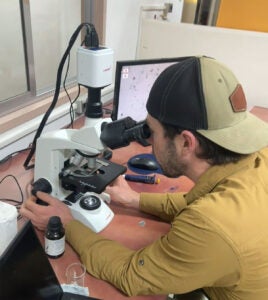
Originally a neuroscience major, Sorel realized that he wanted to be more connected with nature and ended up working in regulating pesticides in Santa Cruz, California. After seeing how many restrictions and limitations were put on farmers in this sector, Sorel felt compelled to find a better way to help farmers.
This led to him working with a grower in Brazil, where he learned more about the soil microbiome and what a healthy soil consisted of. Becoming an expert in soil microbiology, Sorel felt that he could explore and build on concepts in the soil microbiology space with TerraForma.
Lorenzo Arce, a project manager with TerraForma, also had an unconventional entry into the agricultural sector. Originally a mechanical engineering major, Arce discovered a love for farming when a coworker of his asked if he would work some hours at a small farm they had running maple syrup.
“That [work] inspired me to pursue farming more,” said Arce, who afterward proceeded to work on a vineyard in Oregon, an urban farm in West Virginia, a dairy farm in New Jersey, and even as a cheesemaker in Colorado before joining the TerraForma team.
“Farming has just been an awesome opportunity, and I’ve been able to learn so much here and really apply that in the field with farmers,” Arce said.
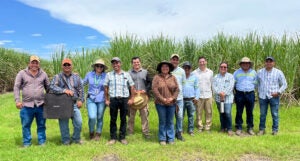
As a company, TerraForma tries to integrate its knowledge with growers, and the company’s agronomists to bring soil biology and ecology information to them. Originally starting as a consultation company, TerraForma focuses its values on integrity, empathy, innovation, and sustainability for farmers.
“We’ve always kind of based our ideology around bringing in more value to growers and making sure that the [profit] margin is there for them. … [We focus on] finding a way to ensure that regenerative craft practices can be profitable for growers,” Sorel said.
Today, TerraForma markets its flagship product, the Terrapod, a bioreactor that is leased or sold to farmers to generate custom microbial products for their fields. The Terrapod is installed on-site in the field and inoculated with native microbes in the soil, leading to a personalized product where the microbial solution never has to be put into dormancy.
The customized and on-site features of the Terrapod address two different issues farmers face with compost and other microbial products: ensuring a locally adapted microbial community and avoiding transport costs, which can be a large fraction of the total cost. By working with farmers to educate and consult on each individual’s unique field, TerraForma helps promote sustainability through profitability.
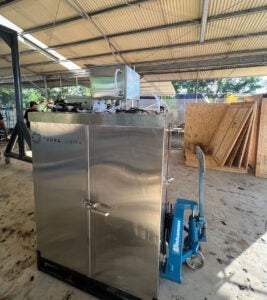
The company focuses on advocating for the farmer and shares as much as possible.
“We don’t keep formulas or anything,” said Arce. “We’re pretty open and willing to share everything we do. … We’re educational as well as beneficial.”
The latest version of the Terrapod is capable of producing up to 10,000 liters of microbial product every two months, which can support up to 500 acres depending on the cropping system.
“All of our equipment is currently scaled for large growers,” said Sorel, addressing one of the common issues of some soil-health practices, which is scaling up for larger operations.
Sorel also knows how risky it can be for a larger operation to fully dive in when implementing a new practice.
“Our expectation is we’re gonna set up some form of trial area or zone where we can experiment with our technology or different processes and validate everything as well,” Sorel said. “Once you see the benefit of a practice, it makes it easier to figure out how to scale it up.”
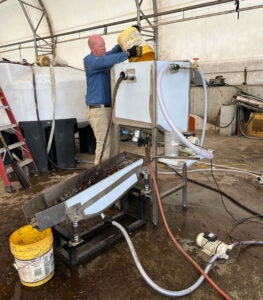
By developing the systems already optimized for large growers and keeping in mind the profit margins for farmers, TerraForma is able to educate farmers and connect them to resources to learn about their soil health, while also providing tangible products that farmers can trust will benefit their fields.
TerraForma’s sustainability through profitability mindset is helping farmers see that they have options in choosing different management practices that can help them maintain their profit margins while simultaneously benefitting their land and planet.
“We can help you in a sustainability aspect, but we’re here for your bottom line. We’re here to help your land and you guys as much as possible,” Arce said.
Liza Thuy Nguyen served as the 2023 American Farmland Trust Agriculture Communications Intern at AGDAILY, with a focus on helping to amplify diversity and minority voices in agriculture. Liza is originally from Anaheim, California, and attended the University of California, Davis, as a first-generation college student. She received a bachelor’s degree in genetics and genomics and went on to earn a master’s in horticulture from Penn State.



